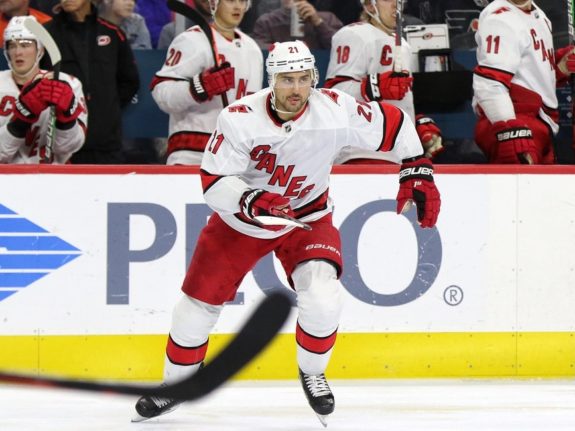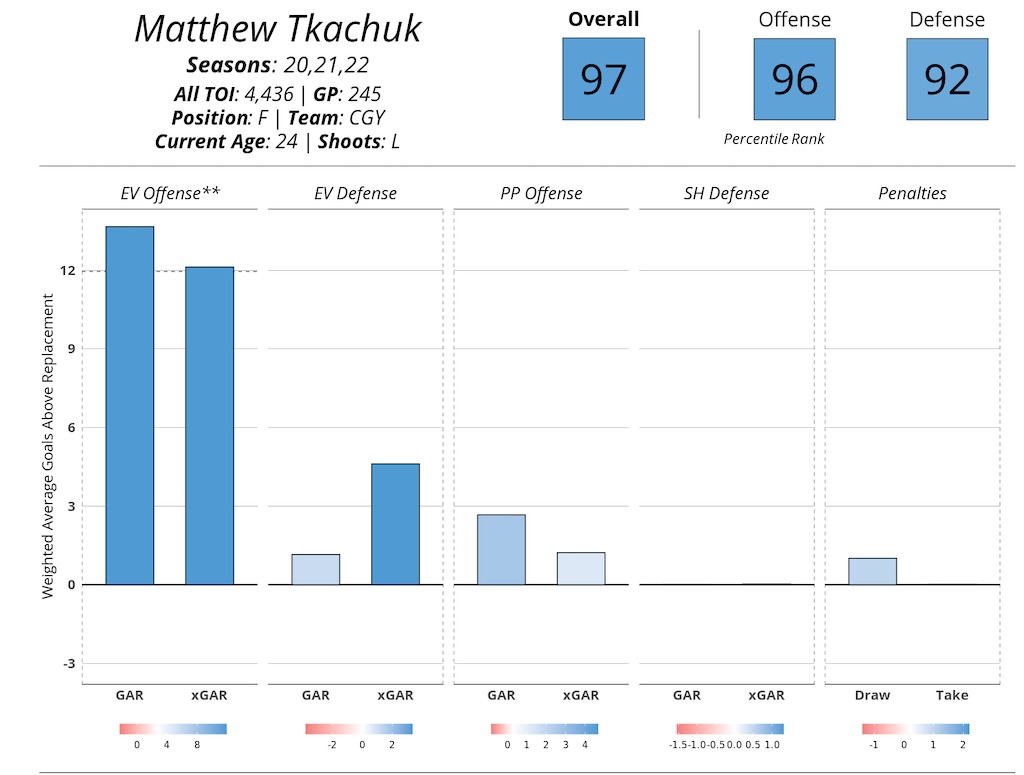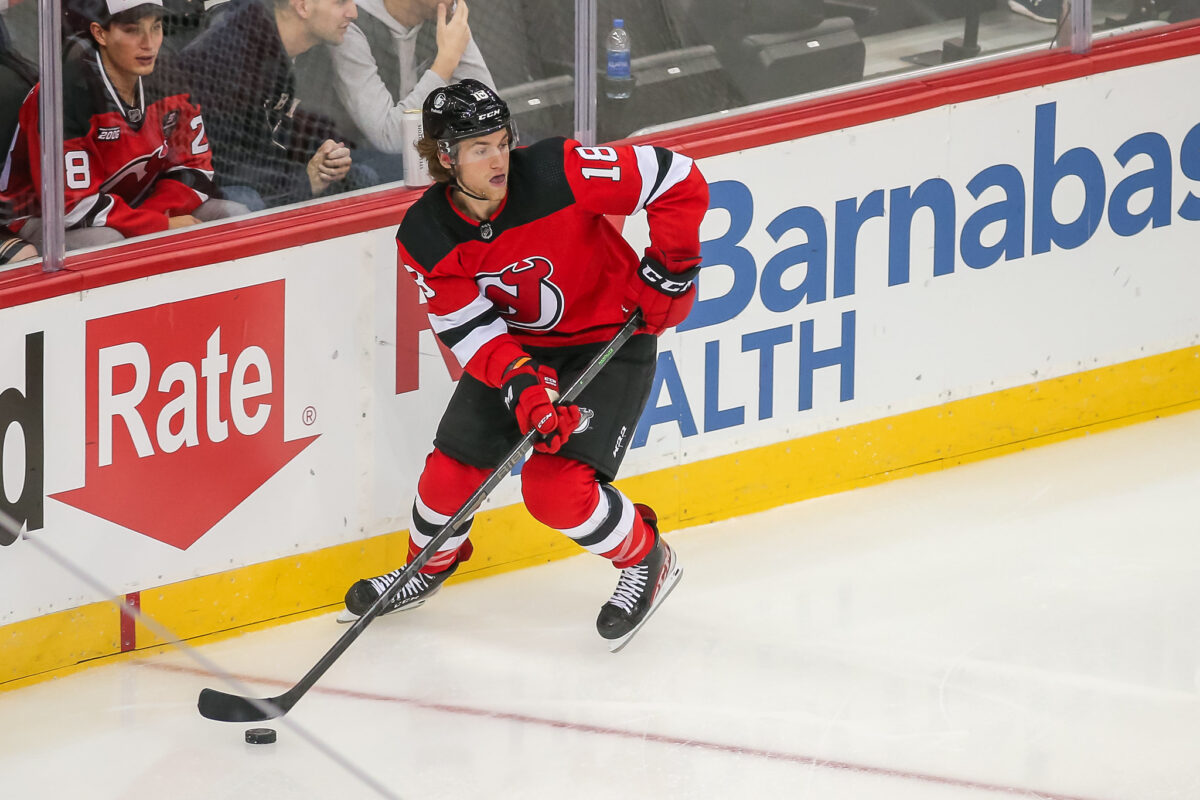The New Jersey Devils got dealt a blow when Johnny Gaudreau signed a whopper of a deal with the Columbus Blue Jackets as a free agent on July 13. Such is life in free agency. You win some, as the Devils did with Dougie Hamilton a year ago. But you also lose some, as was the case with Gaudreau.
Fortunately, they still managed to find an upgrade in Ondrej Palát, who they signed late on July 13. They also acquired Erik Haula from the Boston Bruins to improve their middle-six depth, but they still need to find another top-nine winger, whether in free agency or a trade. Most of these players I’ve spoken about at length this offseason, so it’ll be a refresher of sorts, with a couple of new names thrown in. Let’s look at the team’s remaining options for scoring help.
Devils’ Free Agent Targets
Evan Rodrigues
Evan Rodrigues had a breakout season with the Pittsburgh Penguins, finishing with 19 goals and 43 points in 82 games. Even though he had never scored at a similar clip before, he did show signs during the 2020-21 season that he could become a more reliable scorer; he produced at a 16-goal, 33-point pace over 82 games. Nor was he carried by Sidney Crosby in his two-plus seasons with the Penguins, as he very much held his own when not on Crosby’s line.
Rodrigues has always had good underlying numbers, but they took another step forward in 2021-22. He finished with Corsi and expected goals percentages (CF%, xG%) above 56 percent and was an efficient five-on-five scorer. He excels on the rush, which is how the Devils like to play, and is an efficient puck carrier. Though he needs to convert more often, he’s a high-volume shooter and is an underrated playmaker.
Evolving-Hockey has a projected deal of three years at a cap hit of $3.042 million for Rodrigues. If the Devils don’t find a player that suits them in the trade market over the next couple of weeks and Rodrigues is still available, he could be an option to solidify their scoring depth further.
Nino Niederreiter
Update: Niederreiter signed a two-year deal at a cap hit of $4 million with the Nashville Predators shortly after publication.
If the Devils want someone who’s hard to play against, so to speak, Nino Niederreiter would be it. During his three-plus seasons with the Carolina Hurricanes, he averaged 24 goals and 48 points per 82 games. He shot 14.3 percent over that stretch and is a 12.7 percent career shooter, meaning he can put the puck in the back of the net.

In addition to the goal-scoring he provides, he’s a strong two-way winger and is a good forechecker. He goes to high-danger areas and is not afraid to wreak havoc around the net. The Devils have reportedly been searching for that type of player this offseason, so he fits the bill. Evolving-Hockey has him projected for a seven-year deal at a cap hit of $5.724 million. But if someone were going to sign him to a seven-year contract, it would’ve happened by now, so there might be a chance for the Devils to get him for less term and a lower cap hit than projected.
Sonny Milano
Sonny Milano had a breakout season of sorts with the Anaheim Ducks, finishing with 14 goals and 34 points in 66 games — a 42-point pace over 82 games. That’s why it was a bit of a surprise to see the Ducks not extend him a qualifying offer, which made him a UFA.
Milano is not an elite shooting threat, but he’s a high-end playmaker and was one of the few Ducks players who could create chances other than Trevor Zegras. His five-on-five numbers were among the best on the team, and they were still fine when he wasn’t linemates with Zegras. His five-on-five scoring rate of 1.72 points per 60 minutes is respectable and what you’d want from a middle-six winger. He’s also a strong puck carrier, so he should fit in well on a rush-based team like the Devils. He’d likely come in on a deal around $2 million for one to two years, so he’s worth the gamble.
Trade Options
Conor Garland
During TSN’s free agent frenzy, Mike Johnson mentioned the Vancouver Canucks would likely move one of their forwards to help find some blue line help, which they desperately need. J.T. Miller and Brock Boeser could be options, but so could Conor Garland. That’s especially true after the Canucks signed Ilya Mikheyev to a four-year deal at a cap hit of $4.75 million, which is only $200,000 less than Garland’s.

Though Garland had a bit of a slow start to the 2021-22 season, he ended up with 19 goals and 52 points in 77 games. Over the last three seasons, he’s averaged 22 goals and 55 points per 82 games. He’s been one of the more underrated five-on-five scorers, averaging 2.37 points per 60 minutes, and was the Canucks’ best five-on-five scorer last season, averaging 2.62 points per 60. With a little more ice time, there’s a chance for him to pop, which he showed in 2020-21 with the Arizona Coyotes when he was on pace for 65 points.
After signing Mikheyev, it seems like Garland could be the odd man out. He’s the smallest of the Miller, Boeser and Mikheyev and might not be a good fit for how coach Bruce Boudreau wants to play. The Devils have been chasing Garland for a while, so I wouldn’t be surprised if they circled back now that Gaudreau has gone elsewhere. And after acquiring John Marino from the Pittsburgh Penguins, they may have a surplus of defensemen that could interest the Canucks.
Jesse Puljujärvi
Jesse Puljujärvi has come across plenty of scrutiny recently. Is it justified? Or is it just part of what comes with playing in a media market such as Edmonton? It’s probably somewhere in between, but there is a player with potential. He didn’t light the world on fire in 2021-22, finishing with 14 goals and 36 points in 66 games — a pace of 18 goals and 45 points over 82 games. But there’s more to him than just his counting totals.
Puljujärvi’s underlying numbers last season were fantastic, and it’s not just because he played on a line with Connor McDavid. He finished with a 58.58 CF% and 59.78 xG%, which led the Oilers. And when paired with Puljujärvi, McDavid’s already ridiculous numbers actually improved a bit. Overall, there’s something to build on with the Finn:
What makes Puljujärvi a great player is he’s an elite forechecker who wins puck battles and retrievals. He goes to high-danger areas and creates offense because of his ability to forecheck. What needs work are his puck skills, specifically his shot. You can’t be on a line with McDavid and shoot less than 10 percent and be on pace for 18 goals. Fortunately, that’s something that’s correctable if he puts in the work with a skills coach.
After re-signing Evander Kane, signing Jack Campbell, and needing to re-sign Kailer Yamamoto, it doesn’t appear Puljujärvi returns to the Oilers; nor may he want to. The price for him shouldn’t be outrageous, perhaps a mid-round pick and at this point. For the potential he has, he’s worth a gamble and would be a harder to play against player the Devils are seeking, especially since he measures 6-foot-4, 200 pounds.
Matthew Tkachuk
Yesterday afternoon, The Athletic’s Jeremy Rutherford reported that Matthew Tkachuk, an RFA this summer, won’t sign a long-term deal with the Calgary Flames and that a trade is likely. (From ‘Matthew Tkachuk tells Flames he won’t re-sign long term; trade likely: Sources,’ The Athletic – 7/20/2022)
Related: Devils Have Assets Needed to Acquire Tkachuk
Per Rutherford, one source familiar with Tkachuk’s list said that the St. Louis Blues, Florida Panthers, Nashville Predators, Dallas Stars, and Vegas Golden Knights (Flames writer for Sportsnet, Eric Francis, did refute this, however) are options. The Devils and New York Rangers are also teams that have expressed interest in the past.
There’s no question that the Devils will covet Tkachuk, one of the best wingers in the NHL. He finished this season with 42 goals and 104 points in 82 games, both career-highs. Some of that is due to him shooting a career-high 16.6 percent, plus having one of the highest on-ice shooting percentages in the league. But even though his success during the 2021-22 season was partly due to riding percentages, he’s still an elite, first-line winger:

At 24 years old, Tkachuk is the ideal fit for the Devils. He’s an elite scorer who fits the team’s timeline and provides an edge alongside Jack Hughes or Nico Hischier that the Devils don’t have. The question is, would he be willing to sign long-term in New Jersey? Rutherford may not have mentioned the Devils in his list, but that doesn’t mean Tkachuk would rule it out; Devils general manager Tom Fitzgerald is his cousin, after all.
I’ve seen some people use the Jack Eichel trade as a comparison, and I don’t think that’s unreasonable. If that’s the case, it’d cost the Devils two first-round picks, a top prospect and an NHLer of Alex Tuch’s caliber. The Devils have a deep farm system, so giving up one prospect for Tkachuk should not be an issue. All of this depends on his willingness to sign long-term, of course. Otherwise, there’s no deal to be had.
Devils’ Internal Options
Alexander Holtz & Dawson Mercer
The Devils drafted Alexander Holtz with the seventh overall pick in 2020. While he’s still only 20 years old, this could be his time to shine. He finished last season with 26 goals and 51 points in 52 games for the Utica Comets in the AHL. He’s shown some flashes in the NHL, but the game has been a bit too quick for him so far. With that said, that could change with an offseason of training. He has a high-end shot and is the goal scorer the Devils hope can ride shotgun alongside Hughes for years to come. Is he ready for the big leagues? We’ll find out when camp begins in two months.
The other internal option is Dawson Mercer, who had a solid rookie season, finishing with 17 goals and 42 points in 82 games. His underlying numbers for a 20-year-old rookie were very respectable; a 50.3 xG% and 1.72 points per 60 at five-on-five is pretty good. Mercer also looked quite comfortable on Jack Hughes’ wing, where he had 15 points in 20 games from Feb. 15 to early April.

After Hughes sprained his MCL in early April and missed the rest of the season, Mercer finished with two points in 13 games back at center. The samples are a bit wonky, and Mercer did look good as a center to start the season with Jesper Bratt and Andreas Johnsson. With that said, I think the better fit for him long-term is on the wing, especially if it’s alongside Hughes and Yegor Sharangovich. That’s not to say Mercer becomes a 30-goal, 70-point player next season, but a relatively noticeable jump in production and five-on-five play could be coming. He came close to breaking 20 goals and 50 points as a rookie, and surpassing that next season is not unreasonable.
Related: Devils’ Defensive Depth Improves With Marino Trade
Even though the Devils lost the Gaudreau Sweepstakes, they still found scoring upgrades in Palát and Haula. With that said, they could still use another upgrade somewhere in their top-nine, preferably the top-six. Tkachuk would be the ideal fit, but players like Garland, Puljujärvi or Niederreiter, who can play anywhere in the top-nine, wouldn’t hurt either. They’d likely have to shed some money to create salary cap space to add another winger, but if it helps find them a long-term solution, it’d certainly be worth it so they can compete in the Metropolitan Division as soon as 2022-23.
* * *
Advanced stats from Natural Stat Trick; contract projections from Evolving-Hockey